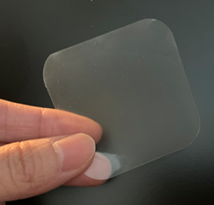Monthly Dapivirine Vaginal Film

Similar to thin breath mint strips that dissolve in the mouth, vaginal films are products designed to dissolve after being inserted in the vagina. The use of films for HIV prevention has been explored in a number of studies of quick-dissolve films or films that would slowly dissolve within one week.
The monthly dapivirine vaginal film is the first film designed to dissolve over the course of one month and is being developed by a team of researchers at the University of Pittsburgh and Magee-Womens Research Institute (MWRI) as a discreet, user-controlled HIV prevention method for women. When placed inside the vagina, and coming into contact with vaginal fluid, the film would begin to slowly dissolve, and in doing so, release the antiretroviral (ARV) drug dapivirine. The drug would continue to slowly be released throughout the month until the film completely dissolves, and all of the drug has been delivered in the vagina. This means that there would be nothing to remove or discard before inserting a new film for another month of protection.
Dapivirine belongs to a class of ARVs called non-nucleoside reverse transcriptase inhibitors (NNRTIs) that prevent HIV from making copies of itself inside human cells, therefore, preventing the spread of HIV inside the body. Dapivirine is already known to be safe and effective for preventing HIV when formulated as a monthly vaginal ring. Like the dapivirine ring, which is approved in several African countries, the film would deliver drug locally, within the vagina, with little drug going elsewhere in the body. Whereas the dapivirine ring contains 25 mg of active drug, 4-5 mg of which is released during the month it is worn, the vaginal film will contain about 35 mg of dapivirine, all of which would be released by the end of the month.
The monthly dapivirine film has undergone extensive laboratory and animal (non-human primate) studies demonstrating that it is able to release drug over 30 days, and importantly, with no safety concerns, but has not yet been tested in women. Before evaluating the dapivirine film for its safety, drug release and acceptability in a first-in-human study, researchers want to be sure that women – particularly, women in Africa – are comfortable with the idea of using a vaginal film that takes one month to dissolve. As such, the MATRIX-002 study is assessing the acceptability, usability and safety of two prototype monthly vaginal films containing no active drug that are similar in size but differ in their shape – one has rounded corners, while the other has straight corners. MATRIX-002 will help researchers understand what refinements may be needed in the film’s design before conducting a trial of the monthly film containing dapivirine.
The University of Pittsburgh/MWRI team is collaborating with the Population Council in the development of the monthly dapivirine vaginal film as well as a dapivirine and levonorgestrel monthly vaginal film for the protection of both HIV and unplanned pregnancy. The Population Council is a global nonprofit research organization that in 2022 acquired the dapivirine product pipeline from the International Partnership for Microbicides.
MATRIX News Releases
Researchers launch first study of a vaginal film that dissolves in 30 days to assess its acceptability as a potential HIV prevention method for women
